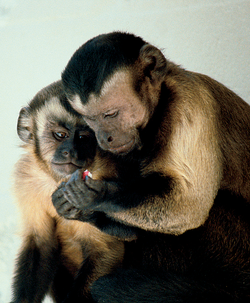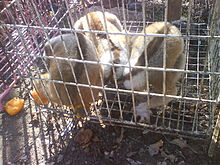- Exotic pet
-
 Capuchin monkeys are among the primates kept as exotic pets
Capuchin monkeys are among the primates kept as exotic pets
An exotic pet is a rare or unusual animal pet, or an animal kept as a pet which is not commonly thought of as a pet.
The definition is an evolving one; some rodents, reptiles, and amphibians have become firmly enough established in the world of animal fancy to no longer be considered exotic.[citation needed] Sometimes any unique or wild-looking pet (including common domestic animals such as the ferret and the domestic rat) is called an exotic pet. "Exotic" may also be used for a species which is non-indigenous to the owner's locale.
Many major pet stores and service providers (such as veterinary insurance carriers or online retailers) tend to classify any animal besides cats, dogs, small rodents, small birds or fish as "exotic".
Contents
Animals kept as exotic pets
- Polecats
- Alligators
- Amphibians
- Arctic Fox
- Bears
- Coyotes
- Wolves and wolf/dog hybrids
- Fennec Foxes
- Tame Silver Foxes
- Red Foxes
- Sugar Gliders
- Indian Star Tortoises
- Skunks
- Wild felines such as lions, tigers, bobcats, servals, and ocelots
- Reptiles such as snakes, turtles, tortoises, and lizards
- Arachnids such as spiders and scorpions
- Insects such as praying mantises, Madagascar hissing cockroaches, and some beetles
- Crustaceans such as yabbies, marron, crabs, and shrimp.
- Rare birds
- Hyenas
- Non-human primates (see below)
Non-human primates
 Animal markets in impoverished, tropical countries often sell primates, such as these slow lorises, to both tourists and local people as pets.
Animal markets in impoverished, tropical countries often sell primates, such as these slow lorises, to both tourists and local people as pets.
It has been estimated that as many as 15,000 non-human primates are kept by private individuals as pets in the United States.[1] Nine states ban the keeping of non-human primates, but no federal law regulates ownership. In 1975, the Center for Disease Control prohibited their import into the US for use as pets. The breeding industry uses descendants of animals imported before 1975.[2] Non-human primates of various species, including those listed as endangered, such as cottontop tamarins, baboons, chimpanzees, Diana monkeys, slow lorises, lemurs and gibbons are still available for purchase in the US.
Many professionals, including veterinarians, zoologists, humane societies and others, strongly discourage the keeping of non-human primates as pets, as their complex emotional and social needs and other highly specialized requirements may be difficult to meet by the average owner.[3]
Although the breeding population has been largely isolated from wild populations outside the US, they still have the potential to transmit zoonotic disease. There is a considerable risk of Monkey B virus from rhesus macaques. Research workers have died from this disease contracted from non-human primate research subjects.[4] Additionally, there is considerable risk to the non-human primate pet through transmission of human disease. One such example is herpes simplex virus, which can be deadly to certain smaller monkeys.[1]
Issues
Legal
The Convention on the International Trade in Endangered Species of Wild Flora and Fauna, or CITES, moderates the trade of some exotic pets around the world, to prevent any threats to their survival and ecological damage. Certain animals may be strictly regulated or restricted outright due to both their conservation status, as well as the possibility of the animal becoming an invasive species.[5]
In some cases laws are circumvented by breeding the animals in captivity. The USDA issues permits for keeping and breeding certain exotic species, whether captured from the wild or bred. In the United States, for example, it is illegal to import non-human primates for the pet trade, but a flourishing breeding industry exists, using animals descended from those brought in legally before the ban was enacted.
In 2003, the US Captive Wild Animal Safety Act became law and in September 2007 the US Fish and Wildlife Service enacted rules to enforce the CWASA. The law now bans the sale or transport of big cats, which includes lions, tigers, leopards, jaguars, cougars, snow leopards, clouded leopards, cheetahs and their hybrids across state lines for the pet trade.[6]
As of November 2010, most US states forbid the possession of exotic pets, but 9 states have no license or permit requriements.[7]
Health
Veterinary costs for treatment of exotic animals may be significantly higher than for a more conventional pet due to the increased specialization.[8]
Some animals are known to carry diseases that can affect humans, such as salmonellosis and rabies. Similarly, some human diseases can be dangerous for certain animals (like strep throat). Many animals have zoonotic potential. Some of the most lethal viruses, the hemorrhagic fevers, are spread through contact with exotic pets, resulting in high death rates and disabilities for those who survive. The American Veterinary Medical Association, the U.S. Department of Agriculture, the National Animal Control Association, the American Zoo and Aquarium Association and the CDC all discourage the private ownership of certain exotic animals.[9]
Husbandry
Providing appropriate environmental conditions, housing and diet for an exotic animal may be difficult for several reasons:
- insufficient information may be available on caring for such animals in captivity
- adequate housing may be difficult and/or expensive to procure or build
- it may be difficult to provide the correct environment (such as temperature or amount of sunlight)
- feeding the correct diet may be difficult or impossible
- providing the right social environment for highly social species may be impossible in a home setting
However, captive care and husbandry information for many commonly kept amphibians, reptiles, birds, and small exotic mammals are widely available through literature, animal enthusiast groups, and Internet websites and discussion forms.
Domestication
Unlike cats and dogs, exotic animals have not been domesticated and remain wild. Even if they are bred for the pet trade and raised by humans, they may be unpredictable, largely untrainable, and in some cases, dangerous, especially as full-grown adults.[10]
References
- ^ a b "The Perils of Keeping Monkeys as Pets". http://news.nationalgeographic.com/news/pf/94367643.html. Retrieved 2008-07-13.
- ^ "B-virus from Pet Macaque Monkeys: An Emerging Threat in the United States?". January–March 1998. http://www.cdc.gov/ncidod/EID/vol4no1/ostrowsk.htm. Retrieved 2010-03-26.
- ^ "The Problem with Pet Monkeys - Keeping Monkeys as Pets". http://exoticpets.about.com/cs/primates/a/primatesaspets.htm. Retrieved 2008-07-13.
- ^ "B Virus (Cercopithecine herpesvirus 1) Infection CDC NCID". http://www.cdc.gov/ncidod/diseases/bvirus.htm. Retrieved 2008-07-13.
- ^ "What is CITES?". http://www.cites.org/eng/disc/what.shtml. Retrieved 2010-03-26.
- ^ Federal Register: August 16, 2007 (Volume 72, Number 158
- ^ See Summary of US State laws regarding Exotic Pets from the Born Free USA website and Map of Exotic-Animal-Laws at Born Free USA website. Both accessed November 17, 2010.
- ^ "Exotic Pet FAQ". http://www.aspca.org/fight-animal-cruelty/exotic-pet-faq.html#small. Retrieved 2010-03-26.
- ^ Exotic animals bringing health risks with them
- ^ [1]
See also
Wikimedia Foundation. 2010.
